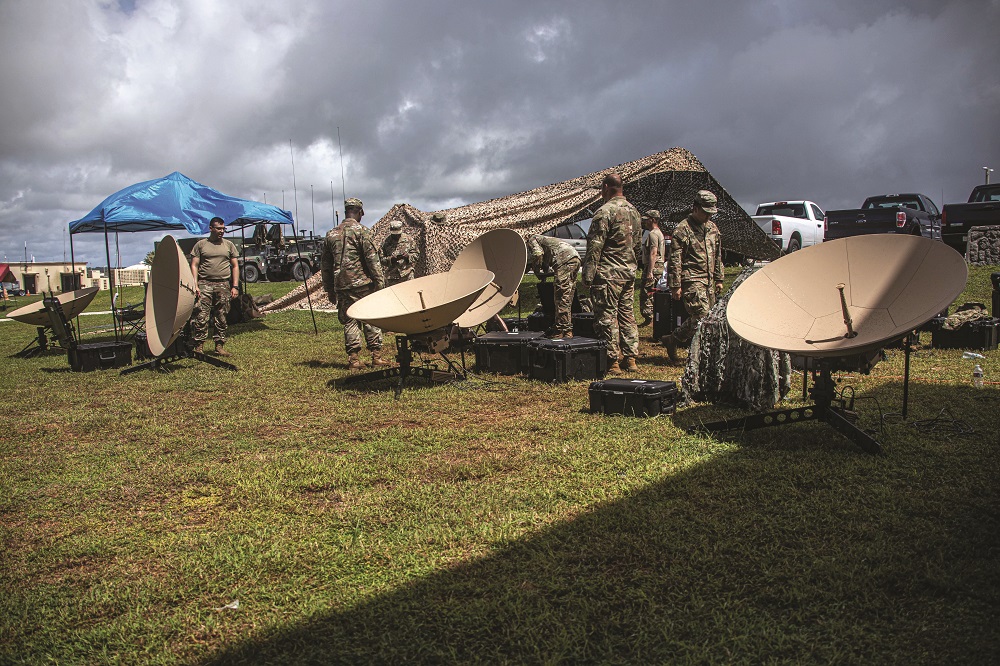WASHINGTON — Pentagon officials have called attention to DoD’s need to access commercial space industry services. However, very little of the Space Force’s budget is being allocated to these types of services, a space industry and budget analyst said May 2.
Commercial space services — enabled by increasingly capable small satellites and cheaper access to orbit — include imagery, space surveillance, weather data, broadband communications and others that could be procured as an alternative to traditional acquisitions.
What the Space Force budget shows is that, other than satellite communications, very few technologies today are bought as services, analyst Mike Tierney, head of legislative affairs at the National Security Space Association, said at a briefing on Capitol Hill.
The Pentagon’s funding proposal for fiscal year 2024 seeks $30 billion for the U.S. Space Force, which DoD called its largest ever space budget.
Most of that funding is for the development and procurement of next-generation satellite constellations and other systems that the government owns and operates. Tierney said it’s difficult to quantify spending on commercial space services because there is no separate funding line for that. He estimates it is only a small fraction of overall spending.
“It’s a fair question, and definitely a question I get a lot,” said Tierney.
“I’m always looking inside of these buckets for commercial activity that meets the expectations of what the industry thinks a commercial capability is,” he said. “But we’re talking about really a fraction of the totality of that $30 billion.”
Tierney said there is a mismatch between the industry’s expectations of DoD as a customer of commercial space services and the actual dollars that are being spent on these emerging technologies.
“There remains a disconnect between what industry wants and believes the department should be doing relative to commercial space investments,” Tierney said. “And I think there will continue to be that friction between what the industry wants and what the government is willing to let go.”
Tierney said one of the government’s reservations about commercial systems is network security. “Every time you bring up commercial services in these conversations, that is often a concern,” he added.
The use of commercial services will likely grow over time,“but there’s still a way to go from what I think the industry is looking for.”
Space Force office to buy commercial services

The Space Systems Command based in Los Angeles last year stood up a Commercial Services Office — recently rebranded as the Commercial Space Office — in the Washington D.C. area.
The office, run by Col. Richard Kniseley, materiel leader at Space Systems Command, was created to figure out what services could be bought from the private sector to supplement or replace government-owned systems.
But making that transition could take years until procurement cycles and DoD’s budget process catch up with users’ demands, said the acting deputy director of the Commercial Space Force Jeremy Leader.
Speaking last month at an AFCEA Los Angeles event, Leader said there are sectors of the space industry developing technologies of interest to the government but for which a commercial market does not yet exist.
An example of that is on-orbit satellite services and alternatives to GPS navigation, he said. “DoD will have to be an anchor tenant for a while until a commercial market emerges … The intent is to help create those markets.”
He said the establishment of a Commercial Space Office was in response to the emergence of “companies and capabilities that we hadn’t seen before.”
Most of the commercial space office’s efforts now are on contracting for satellite communications and for space domain awareness data.
There are still obstacles to buying services that are mostly bureaucratic. “Some of them are of our own making,” said Leader. “We actually want to put our money where our mouth is. It just takes a little bit longer with the budget cycles.”
Not much will change until “we bake these commercial capabilities into our force designs, and into our budgets. It needs to be part of the baseline,” he said.
Once there is a budget line item for a commercial service, Leader added, it will be “very clear for industry and for the program executive officers to be able to execute.”
“If folks don’t have their own dedicated line item for commercial capabilities within their mission area, it makes it kind of convoluted to try to find where that commercial money is actually available,” he noted. “So even if I talk to a PEO who’s willing to do some things commercially, it’s hard to get that message if you can’t point to a line item in the budget.”
